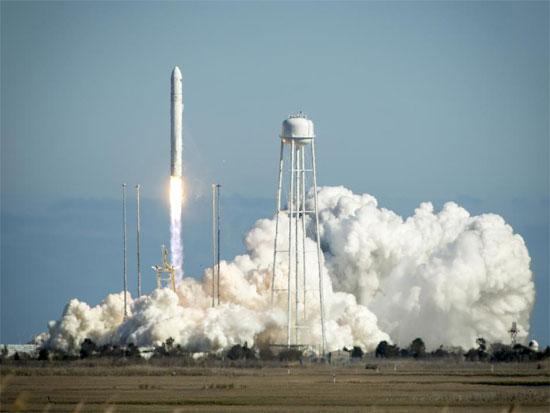New success in US strategic space exploitation
On April 21, Orbital Sciences launched a successful test of the Antares missile, paving the way for the mission of a US private company to transport cargo to the International Space Station (ISS) in the future.
This is the first rocket launch test of a private US firm. The launch was carried out at 17:00 (local time) from the Wallops flying base on an island off the coast of Virginia, east of the United States.

Antares left the launch pad on Wallops Island, Virginia (USA). (Source: NASA)
As a test launch, Antares does not carry the Cygnus freighter - also built by the company - which carries only one ship to simulate 3.8 tons of electronic equipment put into orbit at a level of 257km high after about 10 minutes takeoff. Simulation equipment is about 40m high and has a diameter of 4m. Following the planned launch, the Virginia-based manufacturer will deploy a plan to bring Cygnus to the ISS in three months, after the first flight completed later this year.
In a statement, the manager of the US Aerospace Administration (NASA) Charles Bolden congratulated Orbital Sciences and NASA's team of collaborators for the perfect launch. He pointed out that this successful launch shows the US's strategic strategic plan to combine space with government and private firms on the right track.
Orbital Sciences, together with SpaceX, two US private companies, have been selected by NASA to carry out shipments to the ISS in the future, after NASA has closed its 30-year shuttle program since July 2011. and must rely on Russia's Soyuz vessel to bring astronauts to ISS at a cost of $ 63 million per seat, and bring American goods to ISS by European, Japanese and Russian ships.
According to a $ 1.9 billion contract signed with NASA, Orbital Sciences will begin shipping to ISS in 2016. Meanwhile, SpaceX made history when its Dragon vessel became a commercial spacecraft. first in history "docked" ISS during a test flight in May 5/2012.
So far, SpaceX's Dragon has successfully completed 3 missions to ISS and has to complete 10 more trips under the USD 1.6 billion contract signed by California-based company with NASA.
- Special conference of gold digging table on the universe
- America still leads the world in space research and exploitation
- 4 ways to destroy success without your knowledge
- The secret to success at the age of 30
- NASA postponed the trip out of space a day
- Hydropower stimulates artificial earthquakes
- Discover ancient stone exploitation site to build Nha Ho citadel
- Typical faces of success and wealth
- China will conduct a space walk in 2007
- 2007: China put 3 people into space
- Exploiting groundwater causing earthquakes?
- Extraterrestrial minerals: Delicious but difficult to eat
 Van Allen's belt and evidence that the Apollo 11 mission to the Moon was myth
Van Allen's belt and evidence that the Apollo 11 mission to the Moon was myth The levels of civilization in the universe (Kardashev scale)
The levels of civilization in the universe (Kardashev scale) Today Mars, the sun and the Earth are aligned
Today Mars, the sun and the Earth are aligned The Amazon owner announced a secret plan to build a space base for thousands of people
The Amazon owner announced a secret plan to build a space base for thousands of people